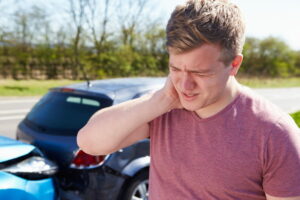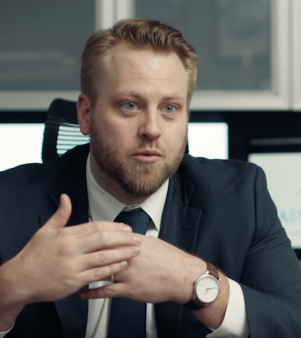
When you file a car accident claim, it’s important to understand the nature of your injuries. The type and severity of any trauma you suffer will directly affect the amount of money you could recover. If you suffered severe injuries that will require lifelong medical care, you’ll want to make sure you pursue compensation that will address all of your needs.
To learn more about car accident injuries and whether you may have grounds for a claim, continue reading or contact the knowledgeable attorneys of Cain Injury Law for a free case review.
Common Car Accident Injuries
According to the National Highway Traffic Safety Administration (NHTSA), more than 2 million people suffer injuries in car accidents every year. Many of these injuries are relatively minor. But in some cases, crash victims sustain injuries with painful, life-changing consequences.
Like no two car accidents are the same, the injuries resulting from a collision can vary widely. However, the following types of injuries are particularly common to car accidents:
Spinal Cord Injuries and Paralysis
The spinal cord is a delicate column of tissue that extends from the base of the brain and carries nerve impulses to nearly all parts of the body. When the spinal cord or the protective structures surrounding it are damaged, communication between the brain and certain parts of the body can be interrupted.
When a spinal cord injury (SCI) occurs, victims can experience loss of function, mobility, or feeling in affected body parts. In some cases, partial or total paralysis can result from SCIs. Data from the National Spinal Cord Injury Statistical Center indicate car accidents are the leading cause of SCI, accounting for almost 40 percent of all new SCI cases.
Whiplash
Whiplash is a type of neck injury commonly caused by car accidents, particularly rear-end collisions. Whiplash injuries occur when the muscles in the neck are strained as a result of being violently and rapidly jerked back and forth, in the same way, you would crack a whip.
When the head and neck are whipped about in a car accident, the extreme forces can injure bones, muscles, and other connective tissues in the neck. Fortunately, many whiplash cases can be treated with rest, pain relief medication, and exercise. However, some victims suffer chronic pain and long-term complications due to whiplash injuries.
Brain Injuries
One of the most serious and potentially life-threatening car accident injuries is a traumatic brain injury (TBI). A TBI occurs when violent blows or jolts impact the head or body and injure the brain. In particularly severe circumstances, foreign objects or broken shards of the skull can directly damage soft brain tissue in penetrating injuries.
Mild, moderate, or severe TBIs can have wide-ranging consequences that require lifelong medical care. A TBI may even lead to a vegetative state, coma, or irreversible brain death in the most severe cases.
Back Injuries
The back is made up of bones, muscles, tissues, and other fragile structures that are extremely vulnerable to the forces of a car crash. Even a low-speed car accident can lead to serious sprains, strains, and soft tissue damage in the back. More severe car wrecks can cause herniated discs, which involve ruptures or painful bulges in the soft spinal discs between the vertebrae.
In catastrophic car accidents, the bones of the spinal column may become fractured or fully broken. This can create pressure on the spinal cord, which may lead to loss of feeling, reduced motor function, or even partial or total paralysis.
Joint Injuries
Joints are the connection points between bones that allow adjacent body parts to move. Joints can be damaged by intense twisting, bending, crushing, or blunt-impact forces in a car crash. In many cases, joints are injured in car accidents when vehicle occupants extend their arms or legs to brace themselves against the impact of the collision.
Knee injuries are some of the most common joint injuries caused by car accidents. Knees are particularly vulnerable in front-impact and side-impact crashes because they can be crushed or pinned against interior consoles if the walls of the vehicle crumple inward.
Burns
Fires are a relatively rare cause of car accident burn injuries, though they can sometimes occur as a result of a defective fuel system or an electrical problem. More frequently, car crash victims are burned when they come into direct contact with hot metal surfaces, scalding vehicle fluids, or scorching steam.
Airbags can cause abrasive burns when they deploy at high speeds and slam into the face, neck, or arms. Some victims also sustain chemical burns from aerosolized sodium hydroxide, a toxic substance that can be released upon deployment.
Finally, friction burns such as road rash can occur when vehicle occupants come into contact with the road or other rough surfaces after a wreck.
Broken Bones
Car accident victims can suffer broken bones as a result of violent impacts, crushing forces, or ejection from a vehicle. Simple breaks and closed fractures may heal with rest and immobilization. More serious breaks such as open fractures or splintering fractures may require surgical intervention or even amputation.
Commonly broken bones that result from car crashes include broken collarbones, pelvic bones, arms, and legs. Broken ribs can also occur when vehicle occupants are thrown sharply against seatbelts or dashboards. Broken vertebrae are some of the most serious broken bone injuries, and in severe cases, they may even be fatal.
Disfigurement
Some car accident injuries never fully heal, leaving victims with substantial scarring or permanent disfigurement. Disfiguring injuries can occur due to severe burns, deep cuts, amputation, or musculoskeletal damage. In some cases, catastrophic disfigurement can even result in a total loss of the ability to move or use certain body parts.
Disfiguring injuries can cause substantial changes in a person’s physical appearance, which in turn can significantly impact mental health. Disfigurement of the hands or face can have negative effects on victims’ self-esteem, social functioning, and overall quality of life. Permanent scars and other disfiguring injuries can also have long-term impacts on a person’s ability to work, take care of daily tasks, and enjoy close personal relationships.
Internal Injuries
Internal injuries involve blood loss or trauma to internal organs. When an internal injury is left untreated, victims can experience severe and sometimes fatal complications. Unfortunately, not all internal injuries are obvious in the immediate aftermath of a car accident. So it’s a good idea to seek prompt medical attention after a crash, no matter what.
Common internal injuries caused by car accidents include punctured lungs, internal bleeding, and lacerated or ruptured organs. Some of the most serious types of internal injuries involve direct or indirect trauma to the brain.
Post-Traumatic Stress Disorder
Most people experience waves of intense emotions such as shock, confusion, and grief after a car accident. However, when these emotions persist and worsen over time, it can be a sign of post-traumatic stress disorder (PTSD). PTSD symptoms develop in people who experience or witness traumatic events and can significantly interfere with daily life.
More than one in five-car crash survivors meet the diagnostic criteria for PTSD, according to research published by the National Institutes of Health. Common symptoms of PTSD include flashbacks, intrusive thoughts, avoidant behaviors, and negative mood changes. PTSD can be treated with certain medications and cognitive therapy.
Can I Get Compensation for My Injuries?
If you suffered injuries in a Lawrenceville car accident that was caused by someone else’s negligent or reckless behavior, you should seek legal advice. In the state of Georgia, you are entitled to compensation for losses suffered in a car accident that wasn’t your fault. In fact, you can even recover money if you were partially at fault, though your compensation may be reduced based on your percentage of fault.
An attorney can help you establish a strong car accident claim and pursue compensation for:
- Your past, present, and future accident-related medical expenses
- Incidental expenses, such as costs of transportation to doctors’ visits
- Repair or replacement costs for vehicle damage caused by the crash
- Lost wages and losses in your future earning capacity, if your injuries prevent you from returning to your job
- The personal costs of your pain, suffering, and losses in quality of life
Contact a Lawrenceville Car Accident Lawyer Today
After a serious car accident, it’s common to feel overwhelmed by painful injuries, exorbitant medical expenses, and substantial life adjustments. The good news is, you’re not alone in this.
At Cain Injury Law, we understand the devastating effects a car accident can have. We’re committed to fighting for your rights and handling every detail of your case so you can focus on your health. Our Lawrenceville car accident attorneys are here to help you getting compensation.
When you’re ready to speak with a qualified attorney about your Lawrenceville car accident claim, contact us for your free consultation.










 Site by Consultwebs.com: Personal Injury Law Firm Website Designers/Lawyer Marketing.
Site by Consultwebs.com: Personal Injury Law Firm Website Designers/Lawyer Marketing.